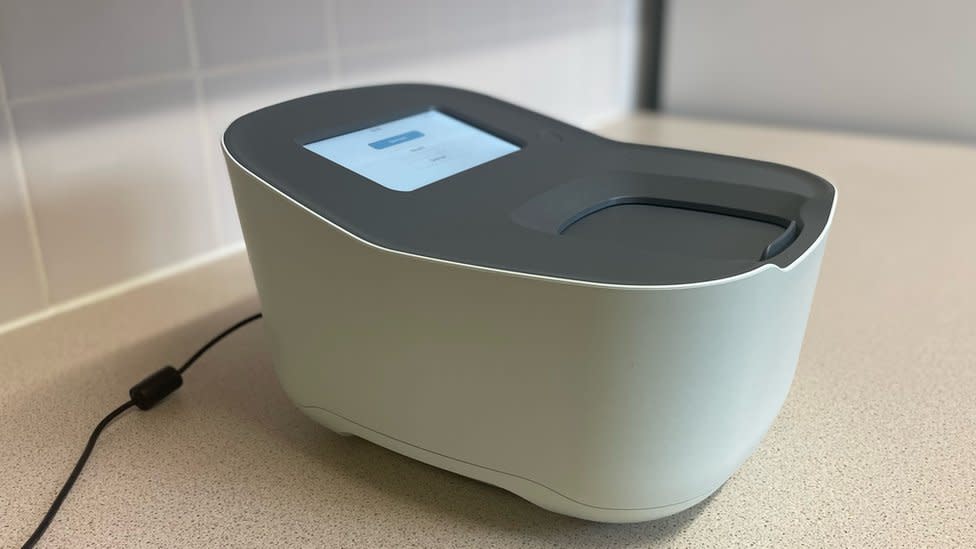Test-at-home kit for cancer patients approved for use

A new device to help reduce the time cancer patients spend in hospital has been given regulatory approval.
The Liberty allows patients to take blood tests - and upload the results - at home, and without supervision.
Its users say it allows them to cut down on draining hospital visits, while clinicians suggest it could boost NHS productivity.
After being trialled at the Christie, in Manchester, the device will now be deployed at 12 NHS sites.
However, Cancer Research UK says it has so far only been trialled on a small number of people. More work is needed before we know whether it can be used more widely in cancer care, the charity says.
Being treated for cancer involves a battery of blood tests, as medical staff monitor multiple health indicators such as haemoglobin levels and total white blood cell count.
Lynn Thompson, who has faced both ovarian and bowel cancer since 2017 - and was one of the trial patients - said being able to do some of those tests at home was a great relief.

"I just fell in love with the machine to be really honest with you. It was so simple to follow and to use," the 52-year-old said.
She said it enabled her to be no longer so tied to a fixed schedule of hospital visits, which she found physically and mentally exhausting - especially given her fear of needles.
"By the time I would go into the blood room to the chair, I would probably faint, and that has a knock-on effect - it made me feel really poorly all day.
"The machine took all that away, it's a simple finger prick that doesn't hurt. It's a small amount of blood and then it's hidden away - there's no stress or anxiety."
The device, the size of a small printer, can feed blood sample analysis directly back to hospital teams.
Sacha Howell, a senior lecturer in medical oncology at the University of Manchester, said the shift to blood testing from the confines of hospital to the comfort of patients' homes was not only more convenient for patients but could also mean savings for the NHS.
Recently, The Christie - one of the largest cancer treatment centres of its type in Europe - has positioned phlebotomy units around the region in what's known as "bloods closer to home."
"But it still means we have to staff those units, in order for the patients to be able to have the blood tests," said Dr Howell.
"If the patients were able to simply do them themselves at home, that would result in significant efficiencies."
Trials conducted at The Christie have yielded promising results, though the patient numbers are low.
There have been 22 patients like Lynn participating in a home study, complemented by regulatory approval trials involving 470 patients.
Cancer Research said those low numbers meant some caution was needed.
"It is very early days" for this tech "and further research is needed" it said in a statement.
"The regulatory approval does not give indications of effectiveness or clinical utility at this stage - those questions would need to be addressed in future clinical trials of the device before it could be used more widely," it added.
The boss of the company which makes it, Entia, is upbeat though about what he says is the world's first ever blood count analyser that patients can use in their own home.
"By providing insights into patients' health status, the device empowers healthcare professionals to pre-emptively address complications, reducing hospitalizations and treatment interruptions," Dr Toby Basey-Fisher said.
